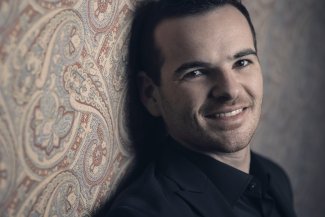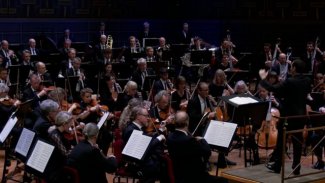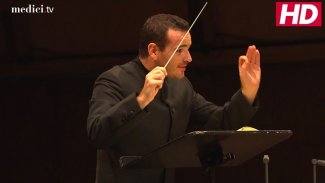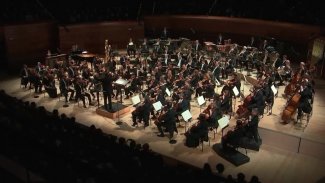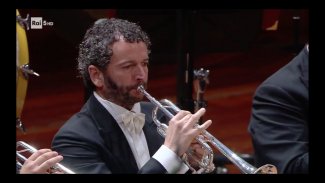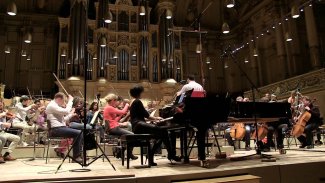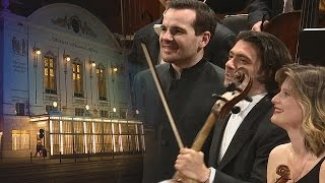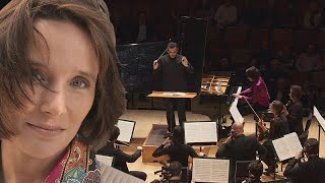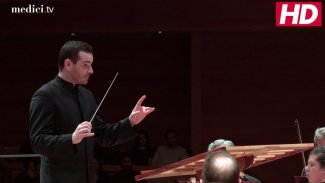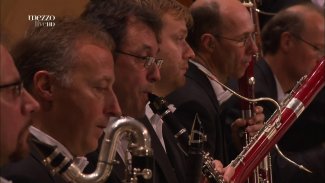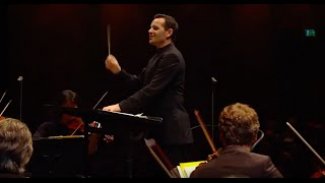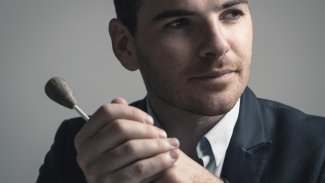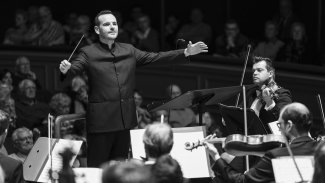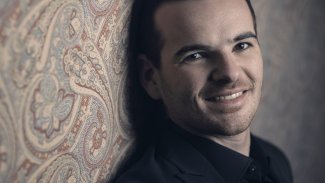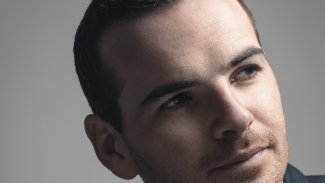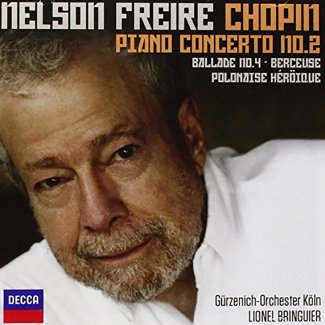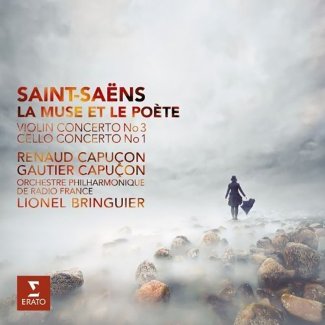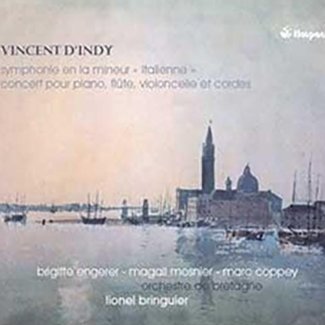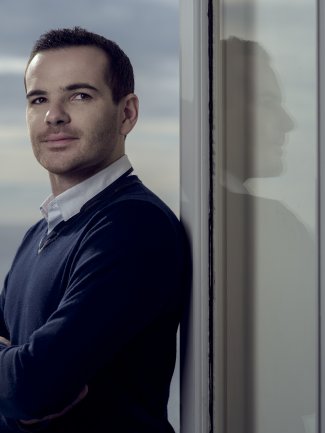
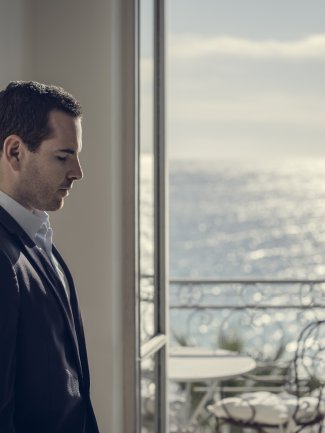
Lionel Bringuier
Download Assets
Honorary Conductor of Nice Philharmonic Orchestra
Music Director of Orchestre Philharmonique Royal de Liège
This season Bringuier begins his tenure as Music Director of Orchestre Philharmonique Royal de Liège. He has ambitious plans for the orchestra, including expanding its performance repertoire, strengthening its relationship with audiences, and enhancing its national and international reputation. His new appointment in Liège allows him to invite several of his closest musical partners, these include Gautier Capuçon, Helene Grimaud, and Jean-Yves Thibaudet and to visit international festivals such as the Festival International d’Aix en Provence and Bad Kissingen. Alongside this new role he is Honorary Conductor of Orchestre Philharmonique de Nice in his hometown and in addition to his symphonic work last season, he conducted a production of Carmen at Nice Opera.
For the 2025/26 season, Bringuier’s guest engagements include performances with WDR Koln Symphony Orchestra, Sydney and Queensland symphonies, NOSPR Katowice, and the Halle. Additionally, he will return to conduct L’Orchestre National Bordeaux Aquitaine with Victor Julien-Laferrière and Enescu Philharmonic with Gautier Capuçon. Highlights of previous seasons include returns to the Deutsches Symphonie-Orchester Berlin for a performance at the Beethovenfest Bonn, and to the LA Philharmonic at the Hollywood Bowl, performances with the Tokyo Philharmonic as well as projects with San Diego Symphony Orchestra, Dresden Philharmonic, Royal Scottish National Orchestra, and the China National Symphony Orchestra.
Show More
Very well-known across Europe and having previously served as Music Director of Tonhalle-OrchesterZürich, Bringuier has also held posts at Orquesta Sinfónica de Castilla y León in Valladolid, Orchestre de Bretagne and Orchestre de Chambre de Paris. Bringuier’s extensive expertise and commitment to the French repertoire have enabled him to curate sophisticated programmes that feature not only underperformed works by composers such as Schmitt and Roussel, but also highlight contemporary French composers, including Guillaume Connesson, Henri Dutilleux, and Eric Tanguy.
Bringuier has cultivated an extensive discography, collaborating with Yuja Wang on a recording of Ravel’s Piano Concerto for Deutsche Grammophon as part of a comprehensive cycle of the composer’s works. Additional recordings feature Chopin with Nelson Freire (DG) and multiple projects in partnership with the Capuçon brothers, such as Saint-Saëns with Renaud Capuçon and Destination Paris with Gautier Capuçon (Erato), released in conjunction with the 2024 Olympic Games in Paris. Bringuier maintains close professional relationships with many of the world’s leading instrumentalists, including Lisa Batiashvili, Anne-Sophie Mutter, Yefim Bronfman, Emanuel Ax, Leif Ove Andsnes, and Janine Jansen.
Bringuier comes from a family of musicians and studied cello and conducting at the Conservatoire de Paris, winning the prestigious International Besançon Competition for Young Conductors only a year after graduating. He cares passionately about education, outreach, and developing the careers of emerging conductors and soloists. In September 2020 he served on the jury of La Maestra, the first international conducting competition for women, and continues to work with local schools in his hometown of Nice to introduce children to classical music and orchestral experiences.
Contacts
worldwide general management
worldwide general management
“Bringuier conducted the ensemble elegantly and thoughtfully; every gesture carried meaning.”
“Under Bringuier, the OPRL offered a light-hearted transparency: the woodwinds exuded spaciousness, while the strings remained supple and rounded in tone. The dialogue betweensoloist and orchestra was exemplary – chamber music in sensitivity, symphonic in sonority.”
“Bringuier’s direction was assured and expressive, guiding the ensemble through the symphony’s stormy landscapes with finesse and fire.”
“Under the precise and passionate baton of Lionel Bringuier, the orchestra displayed an extraordinary sonic palette.”
“delightfully cheerful reading of Beethoven’s Symphony no. 4: light, full of dance, characterised by handover of themes from one instrument to the next so seamless that you felt as if you were listening to a single, shape-shifting musician. Dynamics were daring, from whisper quiet pianissimi in the second movement to fortissimi that were impressive for a chamber orchestra, powered by fine brass and timpani playing.”
“The third movement began almost like a bombast of a Star Wars score and Bringuier’s gestures and precise cues underscored a soundscape of an almost galactic dimension.”
“Here, the discourse is constantly relaunched and reinvented: from the first to the last second, we find ourselves captivated or even bewitched by the intensity of Lionel Bringuier’s interpretation… At the end of the concert, after an ovation of nearly ten minutes, one can only hope for a prompt return of Lionel Bringuier in the Belgian capital with this excellent national orchestra which he knew how to galvanize and inspire.”
“The Tchaikovsky was balanced at the other end of the program by Rachmaninov’s Symphony No 2, in an expansive reading by Bringuier. The conductor unspooled Rachmaninov’s long-breathed melodies with an eye for the big picture, carefully building the first movement to the storm of swirling strings and thundering brass and percussion at its climax. The Scherzo, infused with the darkness of the Dies irae chant, sparkled with horns and racing strings, while the slow movement was achingly romantic, Bringuier once again deftly pacing the climaxes, before dispatching a celebratory finale.”
“Lionel Bringuier was a sensitive partner during the concerto and led an invigorated reading by the SSO of Rachmaninoff’s Symphony No. 2 in E minor, with woodwind and horn solos of richly-coloured clarity.”
“With Ravel’s “Valses Nobles et Sentimentales,” Bringuier further flashed his Ravel credentials. The conductor took some of the waltzes at daringly slow tempos that dripped with sensuality while exulting in the swaying swing of the opening waltz. Bringuier had the help of the L.A. Phil’s jazz-minded soloists pouring on the bluesy slurring in Gershwin’s “An American in Paris.” Three saxophonists were forwardly balanced in the central homesick blues section that gave it a Paul Whiteman-like period sound. Elsewhere, Bringuier made infectiously jaunty work of Gershwin’s fast walks through the French capital.”
“Bringuier took the stage briskly, without fuss, and wearing an immaculately tailored suit and big smile. He plunged immediately into Albert Roussel’s ballet-pantomime “The Spider’s Feast,” drawing from the orchestra a huge palette of dewy, subdued colors, delicately shaded. Bringuier’s gestures on the podium are big but never excessive. He communicated changes of tempo and meter precisely, and the musicians seemed to follow him effortlessly, in the subtlety of his musical imagery and the absolute mastery of his craft, Bringuier’s conducting brings to mind the great Pierre Monteux.”
“Bringuier, who as a Ravel specialist has repeatedly demonstrated a special flair for shaping tonal color, also knows how to conjure up with Rimsky-Korsakov all the richness of sonority from the dazzling score.”
“Bringuier does not seek out the message, the great gesture or the originality: he builds, he guides, he directs while knowing how to let the musicians express themselves. He keeps the building upright by attaching itself to the foundations — splendid articulation, powerful and lively string basses — and the colors — winds are alert and free to sing while taking risks, always assumed.”
“If there was a link between the concerto, Dutilleux’s Métaboles and Ravel’s Daphnis and Chloé Suite No 2, it was in the transparency of the sound achieved under Bringuier, whose debut this was with the LSO. The ecstasies described by Brahms, Dutilleux and Ravel are distinct, and were beautifully individuated by the French conductor.”
